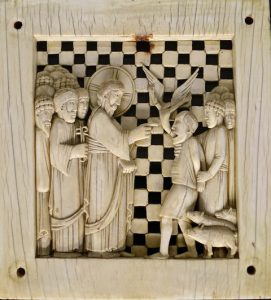HOMILY WEEK 04 01 – Year I
Faith and Healing
(Heb 11:32-40; Ps 31; Mk 5:1-20)
***************************************
Linda’s son consistently got his clothes dirty every time he went out to play, no matter how often she admonished him. One time, he came back with green grass stains on the knees of his jeans, and gave them to her to clean. She was just too tired to scrub them, so just washed them and hung them out to dry. To her amazement, when she brought them in, the sun had bleached the green right out of the jeans. She was instantly reminded of the power of the Spirit to work in our lives, through faith and prayer, and shared that with her son as a lesson in life and faith.
Today’s readings invite us to have faith in Jesus and his power to make healing happen in our lives, to bleach the green stains out of our jeans.
The first reading from Hebrews honours our ancestors whose faith in the past was strong enough to endure suffering of all kinds, to the point of martyrdom. The reading ends with a very interesting comment, however – that these great models of faith did not receive that which was promised because God had prepared something that was better, and that would involve us with them.
 We see that “something better” in action in the Gospel, as Jesus ventures into pagan territory and heals a demoniac. Two realities leap out at us here. The first is the inclusivity and openness of Jesus toward the “other” – with Jesus there is no “in or out,” “who belongs or who does not” – there is just a person in need, and he reaches out to that person. Certainly, we as his followers must do the same.
We see that “something better” in action in the Gospel, as Jesus ventures into pagan territory and heals a demoniac. Two realities leap out at us here. The first is the inclusivity and openness of Jesus toward the “other” – with Jesus there is no “in or out,” “who belongs or who does not” – there is just a person in need, and he reaches out to that person. Certainly, we as his followers must do the same.
Second, Jesus deals with the man’s demons, and banishes them into the herd of pigs. There is a lesson here for us, as each of us has our own need for healing, our own demons for which we need healing. No one gets through this life unscathed – all of us are carrying some resentment, envy, bitterness, negativity, etc. There are no truly righteous persons – we are all in need of healing, and today are invited to come to Jesus with the faith to be healed.
George was troubled by nightmares for over five years – scary dreams in which he was always being attacked, chased, threatened or falling in one way or another. When he shared a particularly fearful nightmare with a friend, his friend simply commented, “Maybe you have to deal with your demons.”
Years later, after a burnout from too much activity in his life, a Jungian therapist pointed out to George that his lifestyle was killing him, and his nightmares were simply his inner psyche trying to communicate that to him. That knowledge helped him to make changes in his lifestyle and the nightmares ended. His next dream was a joyful one and a sign that he had experienced healing in that area of his life.
The 12 Step program has at its core two steps (6 and 7) that address our demons under the name of shortcomings or defects of character: We get ready to have God remove all our defects of character, and then humbly ask God to do so. Those defects of character are painful emotions like anger and resentment; negative attitudes like false pride or stubborn self-sufficiency, or our addictions. These are what Fr. Armand Nigro SJ calls our “sinfulness” – that which makes us sin. For these we don’t need forgiveness – they are not our fault – they just are, but they cry out for healing, and the Good News is that Jesus can and does heal them, in his own way and time. We just need to have faith in him and turn to him in our need.
Bishop Robert Barron poses an interesting question about this demoniac: Why has the man been chained? Is he there on the outskirts of the town for a reason? Philosopher René Girard has written persuasively on the theme of scapegoating violence. Scapegoats perform an important function in the maintenance of human societies, effectively channeling away the competition and violence that would, otherwise, tear a community apart.
And thus is the Gerasene demoniac—precisely as a scapegoat—chained to keep him close? Can we not imagine the citizens of the town coming out to gawk at the poor soul? In the context of this discussion, the tortured man’s name takes on new resonance. He calls himself Legion for there are “many” in him. Could the many in question be each of the citizens of the town who have, to one degree or another, projected their shadows onto him?
By curing the Gerasene demoniac, Jesus announces his intention to break the pattern of scapegoating, thus showing the people of the village a new way of being in community.
The Eucharist is our great act of faith and fidelity, and a source of both forgiveness and healing, if we celebrate it with sincere faith.
So, let us take to heart the message from today’s readings, pray for deeper faith to experience that “something better” that God promised our ancestors, and that has been given to us in Jesus Christ, our Lord and Saviour and Higher Power, and let him bleach the green out of our jeans.



